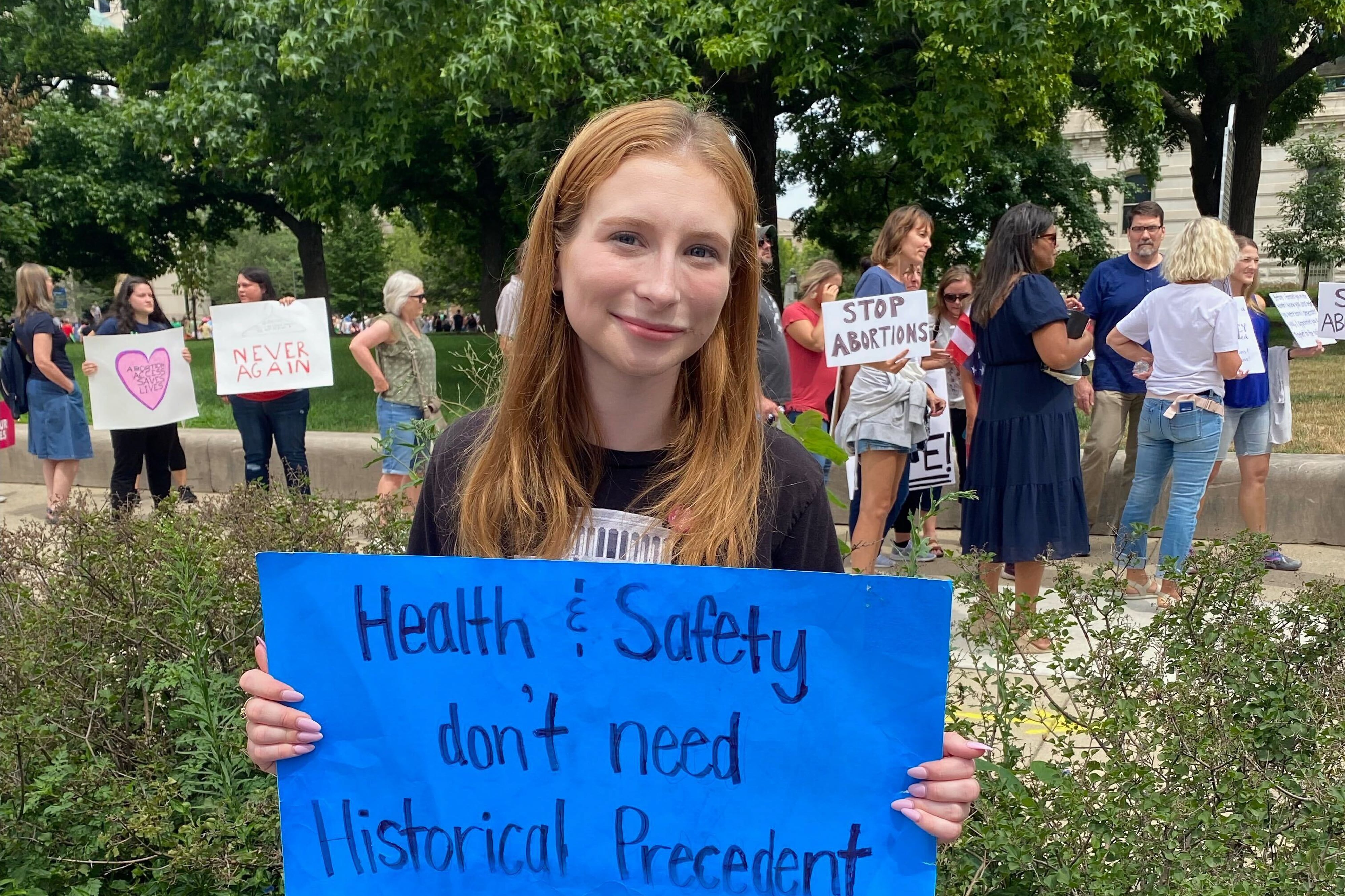Since 2021, a group of students who support abortion rights at Hamilton Southeastern High School in Fishers, Indiana has met once a month to discuss topics that don’t come up often in their classrooms. They’ve analyzed everything from the makeup of the Supreme Court to legislation restricting abortion.
But now, this group — named Royals for Women’s Rights after the high school’s mascot — realizes that activity has also prepared students for a world in which Roe v. Wade no longer exists.
Meredith Kuhl, the group’s founder, said its members knew that as the Supreme Court’s ideological makeup shifted over time, the chances of a reversal of its 1973 decision establishing a constitutional right to an abortion was “a very strong possibility.” But that prospect also shaped the group’s work.
“We were willing to put in the time and the resources to create a safe space and create one that was very education focused,” Kuhl said. “We kind of have this saying: ‘Education first, activism second.’”
Royals for Women’s Rights is an outlier in Indiana, a conservative state where abortion rights are threatened as residents await the outcome from a special legislative session beginning this week. While anti-abortion organizations actively engage students across the country, Kuhl and her classmates had to blaze their own trail with guidance from national organizations like Planned Parenthood or ACLU by using the educational materials they publish.
Kuhl, who graduated from Hamilton Southeastern this year, remembers the notifications that lit up her phone the morning of June 24, when the Supreme Court overturned Roe v. Wade. Now, the students find themselves engaging directly with a polarizing debate in which Indiana is playing a prominent role.
In the special legislative session that began Monday, state lawmakers are considering a bill that would effectively eliminate legal abortions in Indiana. Additionally, in an incident that drew nationwide attention shortly after the end of Roe, an Indiana doctor performed an abortion on a pregnant 10-year-old girl who had traveled to the state from Ohio, where new state restrictions prevented her from receiving the procedure.
While Royals for Women’s Rights previously prioritized education over activism, the latter has now taken on additional urgency.
The group’s next president and rising senior Gabby Paredes, who will take over Royals for Women’s Rights when Kuhl begins attending Indiana University in the fall, said it will continue this effort into the school year.
“It took 50 years for the other side to overturn Roe v. Wade, and it’s gonna be more long years of fighting,” Paredes said. “That requires the younger generation to use their voices and stand up.”
Kuhl and other current Hamilton Southeastern students joined hundreds of other protestors demonstrating and holding signs outside the Indiana Statehouse as the special session began.
“Seeing everybody from different sides of the political spectrum and groups that all kind of collectively joined forces for this was probably the most memorable part,” Kuhl said about Monday’s demonstration in Indianapolis.
Creating a community to turn to
Kuhl said she wanted to start the club after an anti-abortion group was formed by fellow students at the school.
“As with any issue of this nature that’s controversial and that’s constantly being debated, I thought both perspectives needed to be represented,” Kuhl said.
Kuhl began with the support of one of her teachers, and she created a leadership board and planned what topics they would cover, like disparities in health care and current laws. When she thought of what the students needed, the first thing that came to mind was education.
Oftentimes, she said, meetings would discuss the politics surrounding reproductive rights. In addition to the Supreme Court and state bills restricting abortion, students discussed previous decisions the justices had shared publicly, in order to understand the issues better so they could speak about the topic with confidence.
“We think in order for people to be successful activists, they really need to understand the complexities and the facts behind them,” Kuhl said. “Because there will be people who don’t agree with you in life, and if you want to have a productive dialogue, simply stating your opinion isn’t going to do anything.”
The group’s initial meetings were held over Zoom. But when Royals for Women’s Rights held its first in-person meeting, enough students attended to fill a classroom, with around 40 in total. They covered a variety of topics each month, and many students asked for more information on certain subjects.
However, sometimes members of the club felt isolated.
When the group looked for other student-led abortion rights groups in Indiana, they mostly found anti-abortion groups instead. In the past, student organizations like Royals for Women’s Rights have run into controversy when they take place at Indiana schools. In 2017, for example, a student group supporting abortion rights sued a Carmel, Indiana school with help from the ACLU of Indiana, after the group was not permitted to post signs like their anti-abortion counterparts had in the past.
However, Kuhl said the group has not experienced retaliation after she founded the Royals for Women’s Rights group in 2020.
The group also looked at the practical impacts of legislation outside of Indiana. When Texas passed the Heartbeat Act last year that prohibits doctors from performing abortions once a “fetal heartbeat” is detected, the club pulled resources together to teach students what that looked like in practice.
Now that Indiana is considering its own major changes to abortion law, the group organizes carpools and resources in messaging groups for those who want to attend rallies together.
“It was honestly great to have a community like that to turn to, and use our voices to stand up and fight back,” Paredes said. “Because that’s definitely something powerful, and something that we can continue using, especially now.”
Helen Rummel is a summer reporting intern covering education in the Indianapolis area. Contact Helen at hrummel@chalkbeat.org.







